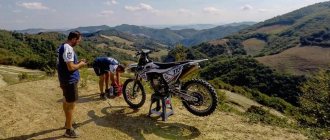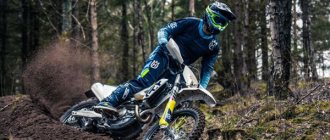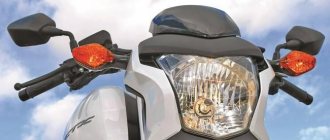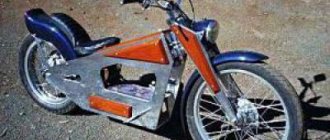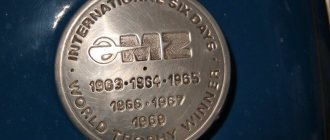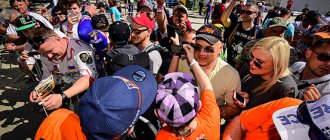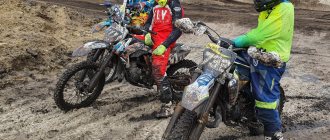On your marks!
Evgeniy was born in the town of Kondrovo, Kaluga region in 1987. If he had been born in another small regional center, one could only dream of a career as a professional athlete, but in this case everything turned out extremely well. A truly huge role in the life of the future motocross star was played by his father, the famous Soviet motorcycle racer Evgeny Bobryshev Sr., who not only guided and supported his son from a very early age, but also personally designed the track in his native Kondrovo and participated in organizing local stages of the competition.
Bobryshev Jr. found himself behind the wheel of his first motorcycle at the age of 7. Seeing how much his son liked his new hobby, the father decided to develop his potential in all available ways. In particular, the real beginning of the young rider’s motorcycle career can be considered small regional motocross competitions, in which he took first place more than once.
Local semi-amateur competitions were followed by large and official ones - the Russian Motocross Championship. The young athlete became its winner for the first time in 1999. Then - in 2000 and again in 2001. Zhenya won all three victories in the “boys” 85 cm3 class.
The list of competitions for the young crossman was not limited to Russia. Thanks to the YUKOS-Motosport project, which supports young promising motorcycle racers, he was able to take part in foreign races. For example, already in 2002, Zhenya tried his hand at the World Motocross Championship, held in Austria. And even though he did not achieve serious success - after two races he failed to rise above the 6th line - his very participation in a competition of this scale brought valuable experience.
As Evgeniy later admitted, in childhood and adolescence, when participating in Russian competitions of various scales, he did not even have to train much - he could easily become a winner without spending any time on preliminary preparation. The reason for this is the relatively little competition, especially among young riders. Someone may regard such a confluence of circumstances as an advantage and a guarantee of an easy victory, but for an athlete who wants to achieve significant results at the world level, it is simply impossible to do without fighting against the strongest competitors and, accordingly, hard training, as was proven by the first participation in a world event scale.
Evgeny Bobryshev: my main “hobby” really interferes with motorcycle racing
A little over a month ago, the World Motocross Championship in the most prestigious class, MXGP, ended. The best Russian crossman Evgeny Bobryshev took a place in the Top 5, slightly retreating from last year’s “bronze” position. However, the athlete himself considers this season a success.
Our conversation with Evgeniy took place just a few days after his two-week vacation, which he spent in his hometown of Kondrovo in the Kaluga region. Now Evgeniy is at home in Holland, where he spends the entire year, with the exception of days or even weeks of traveling around the stages of the World Championship.
So far, the workload in preparatory work for next year’s competitions is not so great. But very soon the athlete’s rhythm of life will change dramatically: physical training will become more frequent and rigorous, and intensive work will begin with the new 2021 motorcycle that his Honda team is preparing for him.
— Evgeniy, do you miss home and family a lot during racing?
— I moved to Holland when I was 18 years old. That is, I have been living away from my family for more than 10 years. At first I wanted to fly to my parents every free day when I had the opportunity, but it cost me energy, and in professional activities you have to follow a routine. It was hard being alone. Now I have my own family - a wife and a three-year-old daughter, who accompany me everywhere and, frankly speaking, help me.
— We have heard a lot about your hometown, where there is perhaps the best motocross track in Russia. To which, it seems, your father, Evgeny Bobryshev Sr., had a hand...
“My father himself was and remains a fan of motorcycle racing, and he knows how to infect everyone around him with this passion. Thanks to him, I got behind the wheel of a motorcycle at the age of 7, and became so interested that it became my life’s work. Now I can’t imagine myself without motocross and, you know, even as a boy I never thought about anything else. The neighborhood guys played football, rode bikes, swam, and I got hooked on motorcycles. For which I am grateful to my father.
— Did your father bring you into the high society of motocross?
— Yes, after I won a lot at the regional and republican level, and then became one of the best in the country, my dad said: I need to go to Europe. It must be admitted that in Russia motocross competitions are organized rather modestly, there are few strong competitors, and without them it is impossible to reach the highest level. That's how I ended up in Belgium, on my first European team.
— And last season you achieved the greatest success in your career so far - 3rd place in the world. Do you probably consider the 2015 season the most successful in your career?
— Of course, that success stands apart. But it’s a sin for me to complain about the results of this season. Yes, in the middle of it another injury happened and I had to “slow down”: I went on painkillers. After the injury, I didn’t spend all the races at my level and that’s when I lost my chances of getting into the top three. And yet, 2021, like the previous one, is considered successful, because one injury during the season is not an injury at all. I've had worse…
—Are you talking about 2014?
- Both 2014 and 2013 were not very successful in this sense, the 13th year in this sense left one continuous psychological negative... After all, our sport is contact and even after a not too serious injury it is extremely difficult to return to your level. And for two years in a row I had serious injuries: a leg injury, then a second one, my back hurt. And the level of competition in MXGP is such that even a bruise can reduce a rider’s concentration, potential, and therefore speed. Here you have to be 100% ready every time. There are tracks where stones fly from under the wheels of competitors into the helmet, into the chest, over the hands where there is no protection. You leave the race as if you left a battle...
— And which routes are the “badest” in this sense?
— The World Cup track is in the Czech Republic, another one is in the north of Italy. It is very dangerous to drive there, there are rocks, difficult terrain, many bottlenecks... However, there is no need to complain: everyone is on an equal footing, every time you have to prove that you are better than others - there is no other way. By the way, I don’t really like the German Grand Prix track, the terrain doesn’t suit me, as they say, it’s “not my track.” And yet, it was there that I won my first victory in the World Championship. Paradox…
— Probably, in addition to the terrain, the racers are greatly influenced by the weather conditions in some countries - hot climate, humidity... Like in Brazil, for example...
— If we talk about Brazilian weather, then it’s paradise compared to Thailand and Indonesia. This is where the real problems are with air temperature, pressure and humidity. Perhaps these two races are the most difficult in terms of climatic conditions...
— If you said about your least favorite tracks, then you should probably also mention those Grand Prix where you feel most comfortable competing?
— Despite the difficulties of the local terrain and soil, I like skiing in the Czech Republic, I love the slopes in Latvia and Brazil. Next season the championship stage will be hosted by Russian Sochi. I want to have a successful ride there too.
— We talked about the tracks. Can I ask about my colleagues in the craft? How is your relationship with them?
— People are different in cross-country, as, probably, everywhere. There are a couple of people in the championship who are very tough, I would say cruel, on the verge of meanness. I don’t want to name them, but I wouldn’t go on reconnaissance with them (smiles). But in principle, everything is very clear: we are all competitors to each other, everyone wants to take a higher place, hence all sorts of “tricks” appear...
— But are there really no people in motocross who live by the old Olympic principle: the main thing is not victory, but participation?
- Well, why, the rules of the championship are quite democratic, in order to enter, you need to perform several not too complicated actions, in particular, pay a fee, it’s something like 1000 euros... And, for example, in Brazil it happens that on the track together Numerous amateurs travel with the members of the factory teams; we call them “hobbists.” He went to the start line and was happy about it. It happens that I overtake him twice in a lap, of course, this is very annoying when I need to speed up and overtake. But this is probably the very “most important thing is participation”... (smiles).
— In order to keep yourself in shape throughout 18 championship stages and more than 10 months of continuous racing, you probably have to deny yourself a lot?
— Yes, and the biggest problem is diet, weight loss in a situation where you have “got too many” kilograms... I am a rather big person - 180 cm tall and about 80 kg in weight, and there is no need for extra kilos in my sport. And since my main hobby outside of motorsports is eating delicious food, losing one or two kilograms is quite difficult for me (laughs). So you have to stick to sports diets.
— It turns out that those who weigh less and are easier in the saddle of a motorcycle?
— Of course, for us, as jockeys, the lower the weight, the lighter the “horse.” Of course, the technology is now such that a difference of 3-4 kg between riders does not have a significant impact on the motorcycle. But there are also those who weigh both 70 and 65 kilograms. And this is already an advantage.
— Do you have to compensate others? How?
- Well, light weight helps some, driving style helps others. I admit that I myself am a supporter of an aggressive style of behavior on the track, one might say “arrogant,” but in a good sense of the word. Well, it’s better not to get into the saddle without proper physical condition. Few people know that in this sense we have one of the most difficult sports. And a crossman needs good stretching, balance, and endurance. Therefore, the most difficult thing in our regime is to get involved in work at the beginning of the season - that is, right now, at the end of autumn - beginning of winter. We train for seven hours, but in my youth in Russia, due to the lack of competition, I could not travel for a month at all, and then come to the competition and easily win.
— But, as far as we know, motocross races are not too long - half an hour or a little more? At such a time distance, what problems might arise?
— The race lasts about 35 minutes, but the main thing in it is to correctly distribute the forces. You can’t rush after the start - you’ll definitely slow down at the end. You have to work a lot with your head, but in race conditions, when your brain is clouded by adrenaline, it’s extremely difficult. The statement fully applies to motocross: experience is a gain.
— You turned 29 years old on November 13. Is this the peak of your career? Or can you compete at a more mature age?
— There are riders who, at 35 and 36 years old, look no worse than their younger competitors. And I roughly use these numbers to determine the end of my career. But still, every top pilot is a unique phenomenon and there are no general recipes for top-class racers. If we talk about me, I haven’t gotten over it yet, I still have desires in this sense.
— What do you like besides a motorcycle? You said about your main hobby - eating delicious food. What else do you pamper yourself with in your rare moments of free time?
— In principle, I am far from the classic hobbies of Russian men - fishing and hunting. However, I like to sit with a fishing rod, but without fanaticism. But everything related to technology is not indifferent to me. I love both circuit motorcycle racing and karting, I really like this kind of fun on the water: jet skis, for example, or, especially, flyboards.
— Your father gave you a start in life by putting you on a motorcycle. What sport do you see your daughter playing?
- Well, she definitely won’t be a motorcyclist (laughs). In February, Eva will turn 4 years old and, according to Dutch law, she will have to go to primary school. So education is now coming to the fore. But she is a very active child and just needs physical activity to burn off energy. So we take swimming courses and dance classes. It is worth saying that on Sundays, when we are not at the race, we go to a neighboring big city, where there is a Russian school, where children dance and sing in the choir. I think that as Eva grows up, she will choose her favorite sports activity, and my wife and I, naturally, will help her.
Sudden castling
A series of domestic victories and foreign failures, which, nevertheless, showed the talent of the young crossman, was followed by a rather unexpected castling. In 2003, by decision of the management of YUKOS-Motosport, Evgeny Bobryshev switched from a light motocross motorcycle to a more powerful road motorcycle in order to represent the team in the Russian ShKMG Championship in the 125 cm3 (SS400) class. Despite the fact that there is quite little in common between motocross and road racing, Zhenya managed to show his talent here too: already in the first stage he became a leader, and then finally proved his skills, becoming the winner of the entire Championship. By the way, thanks to his efforts, YUKOS-Motosport also won in the team competition by almost a double margin.
Surprisingly, the resounding victory did not make the athlete turn away from motocross, which had already become his home. Due to the lack of a good training base in Russia, the general low level of development of GCMG in the country and a real love for the difficult conditions of cross-country races, he decided to abandon further development in the direction of road racing.
Back to the native off-road
A significant role in this decision was played by the move to the Netherlands, which happened in 2005, which allowed Evgeniy to reach a new level in what had already become his native motocross - in the same year he took part in the European Championship in the EMX2 class.
Unfortunately, he didn’t even claim victory and ended up taking only 18th position - due to lack of training. However, such a failure should hardly be regarded as a serious defeat. On the contrary, a serious challenge forced Evgeniy to work even harder on himself and next year to enter the European Championship track again. However, this attempt was not a triumph and brought only 12th place in the final standings.
2007 turned out to be quite controversial for Bobryshev’s career. On the one hand, he brought another unconditional victory to the athlete’s list of achievements. She won gold in the Russian Motocross Championship in the 125 cm3 class. On the other hand, this year Evgeniy did not participate in the competition with the strongest racers in Europe. Perhaps it was the last moment that was the reason that the following year, already at the World Championship in the MX2 class, he was given only 24th place. However, the athlete clearly did not plan to give up, and also took part in the second most important competition in the motocross world - the famous “Motocross of Nations”. In his B-final he took 3rd place. By the way, at the time of the competition, he had already ceased to be a solo racer and became part of the Dutch professional motorcycle team Yamaha Van Beers Racing.
2009 was a busy year for him. Firstly, Evgeniy again took part in the Russian Motocross Championship, and in the next class - 250 cm3. And this event again brought him victory. Secondly, he managed to achieve impressive results in his native Dutch Championship - here the crossman took silver. And finally, thirdly, together with the team he again took part in the World Cup, but only took 20th place.
New turn
In 2010, the Russian-Dutch racer was noticed by the management of a higher-level motorcycle team, CAS Honda, which has factory support from the famous Japanese brand. Together with her, Evgeniy managed to move up to the next, now premier class, MX1. The support of the new team almost instantly bore fruit: at the end of the year, Bobryshev entered the TOP 10 of the MX1 World Championship. As a result, an official invitation to Honda World Motocross (Team HRC). It was cooperation with her that allowed him to achieve the highest results:
- Take 10th place in the Motocross World Championship in the MX1 class in 2010. Also in the same year, Evgeniy became the British champion, but in an individual event.
- 4th place in the World Championship (MX1 class) in 2011.
- 9th place in the World Championship in 2012. In the same year, Bobryshev returned home again with the gold prize of the Russian Motocross Championship in the 250 cm3 class.
- 8th place in the World Cup in 2013.
- 14th place in the World Championship in the MXGP class in 2014.
- 3rd place in the World Championship (MXGP) in 2015. This achievement brought the athlete the title of Master of Sports of International Class, since before him, the last time only the Soviet racer Vladimir Kavinov managed to take the top three in a global competition. This was in 1979.
- 5th place in the World Championship in 2021 and in 2021 in the MXGP class.
After the end of the 2021 Motocross World Championship, Team HRC's collaboration with Evgeniy suddenly came to an end. It is quite possible that the strict and calculating Japanese leadership was dissatisfied with his successes. However, the athlete was not left without support - he was invited to BOS GP - a private team from France, also participating in MXGP. Moreover, the purpose of its participation in the prestigious championship turned out to be quite unexpected - the manufacturer of suspensions and shock absorbers, who was the founder of the motorcycle team, decided to test its achievements “in the field.”
Together with new teammates in 2021, Evgeny Bobryshev again became the British Motocross Champion in the MX1 class. In 2019, his contract was extended, but on January 12, the driver fell during training and severely injured his right hand. Because of this, he was forced to miss a number of competitions and even after returning he was far from performing at full strength. And as if to confirm that it was too early for him to return to the track, the first round of the MXGPRussia qualification turned into a new injury for him - as a result of a fall, he received a closed fracture of the tibia of his right leg and was out of the competition for the rest of the season.
Be that as it may, Evgeniy is now back in the saddle. At the very end of last year, he signed a contract with a new team - PAR Homes RFX Racing, with which in 2021 he planned to again take part in the World and British Championships, which were greatly “delayed” in light of recent events. Be that as it may, Bobryshev does not plan to stop there and will definitely return to European tracks after the end of the pandemic.
Excerpt characterizing Bobryshev, Evgeniy Evgenievich
“But this still does not mean that the campaign is over,” said Prince Andrei. - And I think it’s over. And so the big caps here think, but they don’t dare say it. It will be what I said at the beginning of the campaign, that it is not your echauffouree de Durenstein, [the Durenstein skirmish] that gunpowder will decide the matter, but those who invented it,” said Bilibin, repeating one of his mots [words], loosening his skin on the forehead and pausing. – The only question is what the Berlin meeting of Emperor Alexander with the Prussian king will say. If Prussia enters into an alliance, on forcera la main a l'Autriche, [they will force Austria] and there will be war. If not, then the only question is to agree on where to draw up the initial articles of the new Campo Formio. [Campo Formio.] - But what extraordinary genius! - Prince Andrei suddenly cried out, squeezing his small hand and hitting the table with it. - And what happiness is this man! - Buonaparte? [Buonaparte?] - Bilibin said questioningly, wrinkling his forehead and thereby making it felt that now there would be an un mot [word]. - Bu onaparte? - he said, emphasizing especially the u. “I think, however, that now that he is enacting the laws of Austria from Schönbrunn, il faut lui faire grace de l'u. [we need to rid him of i.] I decisively make an innovation and call it Bonaparte tout court [simply Bonaparte]. “No, no joke,” said Prince Andrei, “do you really think that the campaign is over?” - That's what I think. Austria was left in the cold, and she was not used to it. And she will repay. And she remained a fool because, firstly, the provinces were ruined (on dit, le Orthodox est terrible pour le pillage), [they say that the Orthodox is terrible in terms of plunder,] the army was defeated, the capital was taken, and all this pour les beaux yeux du [for the sake of beautiful eyes,] Sardinian Majesty. And therefore - entre nous, mon cher [between us, my dear] - I instinctively hear that we are being deceived, I instinctively hear relations with France and projects for peace, a secret peace, separately concluded.
